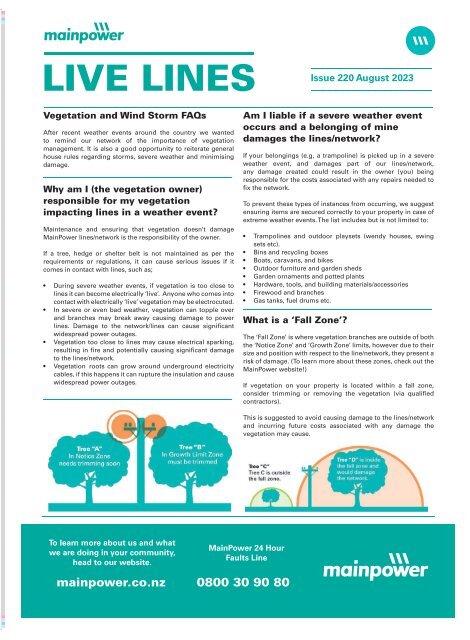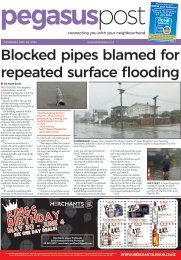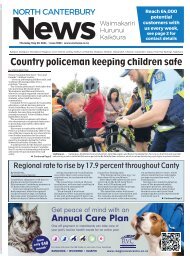North Canterbury News: August 03, 2023
Create successful ePaper yourself
Turn your PDF publications into a flip-book with our unique Google optimized e-Paper software.
LIVE LINES<br />
Issue 220 <strong>August</strong> <strong>2023</strong><br />
Vegetation and Wind Storm FAQs<br />
After recent weather events around the country we wanted<br />
to remind our network of the importance of vegetation<br />
management. It is also agood opportunity to reiterate general<br />
house rules regarding storms, severe weather and minimising<br />
damage.<br />
Why amI(the vegetation owner)<br />
responsible for myvegetation<br />
impacting lines in aweather event?<br />
Maintenance and ensuring that vegetation doesn’t damage<br />
MainPower lines/network is the responsibility of the owner.<br />
If a tree, hedge or shelter belt is not maintained as per the<br />
requirements or regulations, it can cause serious issues ifit<br />
comes in contact with lines, such as;<br />
• During severe weather events, if vegetation is too close to<br />
linesitcan becomeelectrically ‘live’. Anyone who comes into<br />
contact withelectrically‘live’vegetation may be electrocuted.<br />
• In severe or even bad weather, vegetation can topple over<br />
and branches may break away causing damage to power<br />
lines. Damage to the network/lines can cause significant<br />
widespread power outages.<br />
• Vegetation too close to lines may cause electrical sparking,<br />
resulting in fire and potentially causing significant damage<br />
to the lines/network.<br />
• Vegetation roots can grow around underground electricity<br />
cables, if this happens it can rupture the insulation and cause<br />
widespread power outages.<br />
Am Iliable if asevere weather event<br />
occurs and abelonging of mine<br />
damages the lines/network?<br />
If your belongings (e.g, atrampoline) is picked up in asevere<br />
weather event, and damages part of our lines/network,<br />
any damage created could result in the owner (you) being<br />
responsible for the costs associated with any repairs needed to<br />
fix the network.<br />
To prevent these types of instances from occurring, we suggest<br />
ensuring items are secured correctly to your property in case of<br />
extreme weather events.The list includes but is not limited to:<br />
• Trampolines and outdoor playsets (wendy houses, swing<br />
sets etc).<br />
• Bins and recycling boxes<br />
• Boats, caravans, and bikes<br />
• Outdoor furniture and garden sheds<br />
• Garden ornaments and potted plants<br />
• Hardware, tools, and building materials/accessories<br />
• Firewood and branches<br />
• Gas tanks, fuel drums etc.<br />
What is a‘Fall Zone’?<br />
The ‘Fall Zone’ iswhere vegetation branches are outside of both<br />
the‘Notice Zone’and ‘GrowthZone’limits, however due to their<br />
size and position with respecttothe line/network, they presenta<br />
risk of damage. (To learn more about these zones, check out the<br />
MainPower website!)<br />
If vegetation on your property is located within a fall zone,<br />
consider trimming or removing the vegetation (via qualified<br />
contractors).<br />
This is suggested to avoid causing damage to the lines/network<br />
and incurring future costs associated with any damage the<br />
vegetation may cause.<br />
To learn more about us and what<br />
we are doing in your community,<br />
head to our website.<br />
MainPower 24 Hour<br />
Faults Line<br />
mainpower.co.nz 0800 30 90 80


















